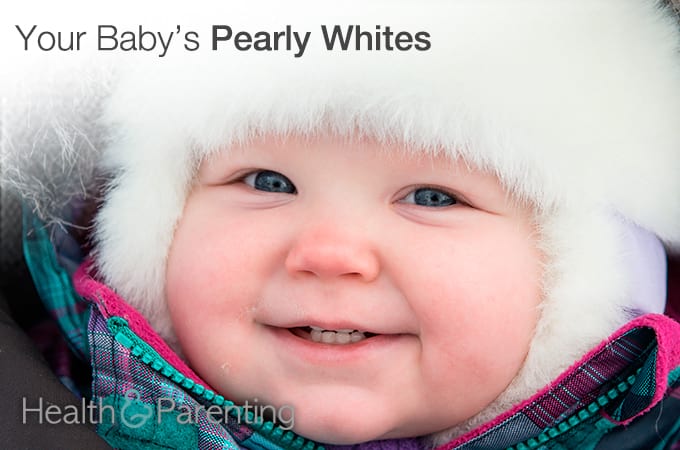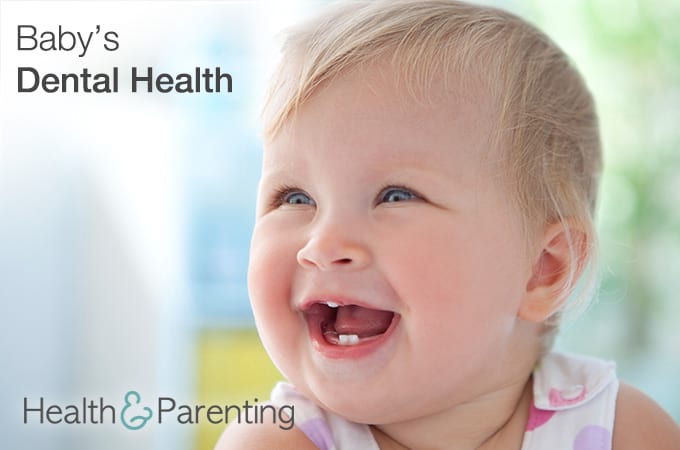For months you’ve been enjoying your baby’s gummy smiles. But your baby has started drooling a little, and seems to want to chew on everything and anything. Are her first teeth ready to erupt?
Teething signs and symptoms
When your baby starts teething, you may notice the following:
- Drooling
- Biting
- Sucking on hands
- Irritability, fussiness
- Wakefulness
- Ear rubbing
- A rash on the chin or around the mouth
When will my baby get teeth?
The lower central incisors are typically the first teeth to erupt – usually between 6 and 10 months. But your baby may show teething signs months ahead of that as the teeth start to push up through the gums. The top central incisors will show up between 8 and 12 months. And the remaining teeth slowly appear over the next couple of years, with the second molars coming in when your baby is 2½ to 3 years old.
What can I do about teething pain?
Those gums are sore! But pressure seems to make them feel better. Find one or two safe teethers that your baby really loves – they might be wooden, rubber or even cloth. Try gum massage – using a clean index finger, gently rub small circles all around baby’s gums. Freeze a wet washcloth and allow baby to chew on it, or put a baby spoon in the fridge to chill and give it to baby as a teether. Talk to your doctor about pain relievers – ibuprofen and acetaminophen may be useful for the worst bouts of pain but it’s best to consult a doctor first. Consider topical pain relievers, too.
How do I care for my baby’s teeth?
Even before those first teeth appear, you may want to use a washcloth or small piece of gauze over your finger to gently wipe baby’s gums after eating. The using a small, soft toothbrush and water only, you can clean the teeth as they appear. Be sure to brush the front and back of the teeth. You can slowly start using toothpaste as your baby gets older (start with just the tiniest smear and graduate to a pea-sized dollop of a gentle toothpaste when your child is around age 3).
Experts recommend scheduling your baby’s first dental exam between the ages 1 and 3 to check tooth development, with regular checkups thereafter.
Allow your baby a few sips of water after meals to wash away food particles. Don’t allow your baby to fall asleep with a bottle or sippy cup to prevent tooth decay. Breastfeeding to sleep, however, doesn’t need to be avoided, as the breastmilk doesn’t typically pool in the mouth in the same way.
Now that she has teeth, do I need to stop breastfeeding?
Many moms worry about baby biting the breast when feeding. When the baby is latched correctly, the tongue typically covers the lower gums and biting is unlikely. If baby falls asleep and lets go a little, he may try to recover by clamping down with his gums – and his new teeth. Paying close attention and removing baby from the breast when he is done actively nursing can prevent this from happening. Occasionally baby’s teeth will irritate the areola while nursing. Getting the best possible latch and changing positions often alleviates this problem.
When will my child start losing teeth?
Around age 6, your child may start losing their “baby teeth” – typically with the lower central incisors coming out first.
Fun Fact
Occasionally babies are born with teeth. Though very rare, these “natal teeth” have very little root structure holding them in place and are typically removed in the first couple of days after birth.
Written by Michelle, childbirth instructor, lactation consultant, and mother to 4 busy kids
This information is not intended to replace the advice of a trained medical doctor. Health & Parenting Ltd disclaims any liability for the decisions you make based on this information, which is provided to you on a general information basis only and not as a substitute for personalized medical advice. All contents copyright © Health & Parenting Ltd 2016. All rights reserved.











